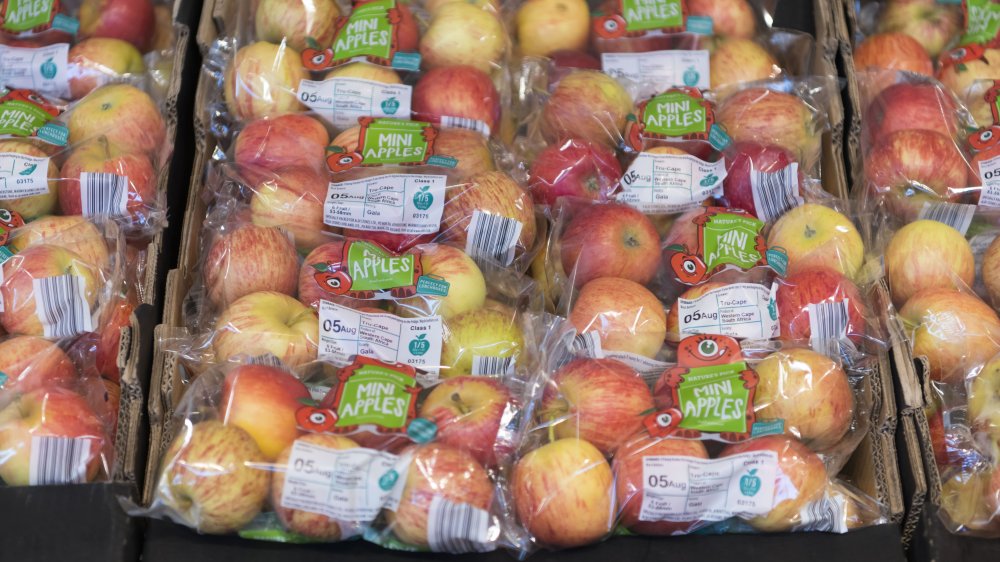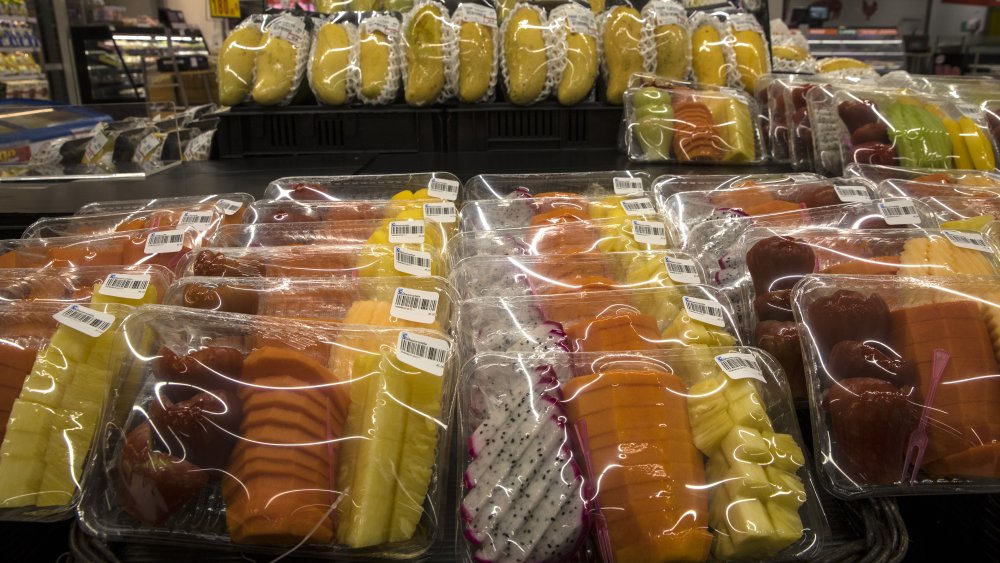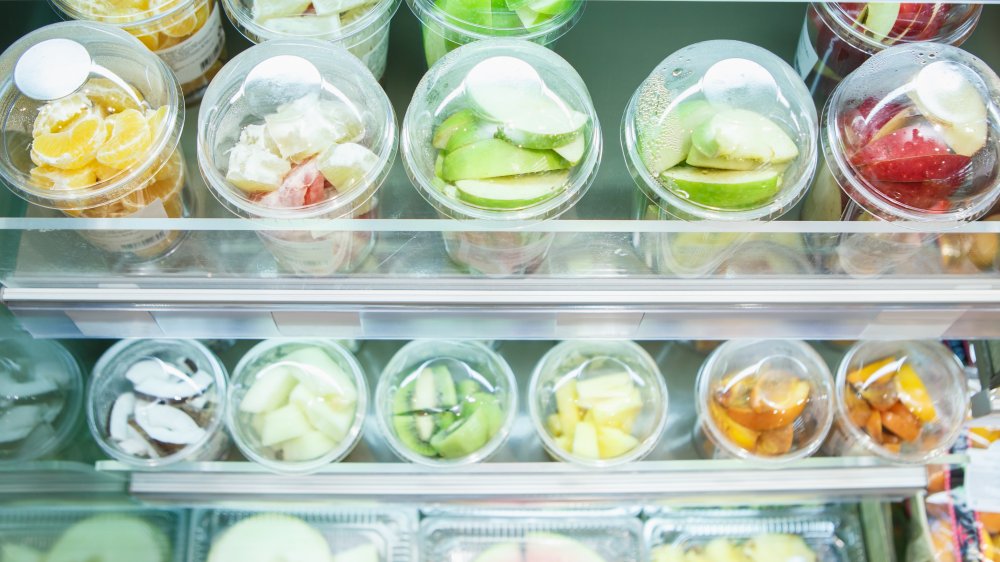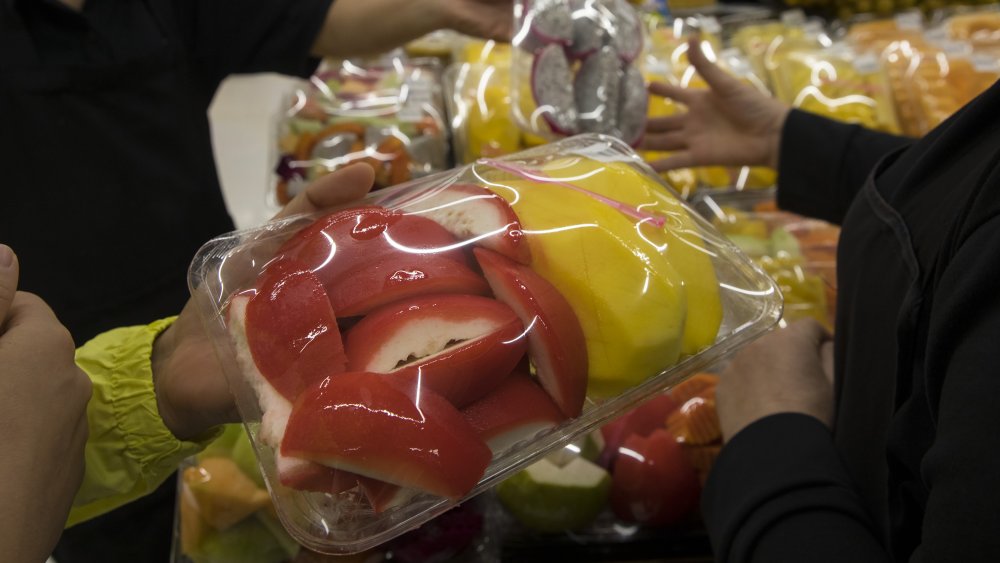Why You Should Never Buy Produce Wrapped In Plastic
The grocery store is filled with unnecessary plastic, and one of the biggest offenders is produce wrapped in plastic. In addition to being wasteful and difficult to unpack, it is also bad for the planet and your health.
A major offender of single use plastic is pre-cut produce. Think cut watermelon and pre-packed berries, as well as pre-sliced squash meant to save you prep time in cooking. However, while they may save you time, they cost you in lost nutritional value. According to Caroline West Passerrello, a spokesperson for the Academy of Nutrition and Dietetics: "Cutting fruit or vegetables exposes them to oxygen and light, and sometimes heat, all of which affect vitamin retention in food." Basically, uncut produce has a natural wrapping that protects their nutritional value from the natural elements of air and weather (via Men's Health).
Another thing to keep in mind is food safety. Most of the produce recalled for food contamination is pre-packaged, such as pre-made salads or pre-cut lettuce. The plastic packaging provides bacteria with a warm and moist environment, the ideal place for bacteria to grow.
The advantages of plastic
On the other end of the spectrum, packaging can protect produce from the many hands that touch it from the field to the shelf; from the farm workers picking the produce to transportation to the stores, to employees putting it on the shelves, to other shoppers picking through it to find the right produce to buy. The packaging ensures that no germs or bacteria infect the produce between when it is picked and when you buy it in the store (via Eco & Beyond).
The reason so much produce gets individually wrapped in plastic is, unsurprisingly, economic. Organic produce in particular, is subject to spoilage, or what the retail industry calls "shrink." By wrapping individual items in plastic, it prevents one rotten piece of produce from spoiling other produce in the same container. The proverbial bad apple that spoils the whole bunch, if you will, only somewhat more literally. Organic produce is not allowed to be stored where it is in contact with nonorganic produce, so the plastic wrapping also prevents that occurrence, making it easier for stores to stock their shelves (via Sierra Club).
Another economic advantage of individually wrapped produce is it reduces dehydration, and allows a surface where the store can stick the UPC code. This reduces waste and speeds up the stocking and check out times.
Unfortunately, much of the plastic used in grocery stores is single use and ends up in the ocean. This leads to animals consuming it.
Not all plastic gets recycled
While developed countries like the United States tout recycling as a major industry, fewer things than you imagine actually get recycled. The system is simply not big enough to account for the huge amount of plastic waste being used and thrown away (via Self).
There are seven kinds of plastic, and while the technology exists to recycle them all, it isn't employed for that purpose. Instead, only PET, the plastic used for soda bottles, and HDPE, a somewhat opaque plastic used for cleaning products and milk jugs, are the only two types of plastic to actually get recycled. That means the plastic on your individually wrapped cucumber is not getting recycled.
Different types of plastic have to be recycled separately due to the different chemicals in the plastic. Most domestic recycling facilities don't have the capability to do that. As a result, the way to limit plastic isn't in recycling used plastic, which is difficult, but in reducing the use of wasteful and unnecessary plastic in the first place. Some cities and states have instituted bans on plastic shopping bags, and that is a huge step, reducing the number of single use shopping bags that inevitably end up blowing around in the parking lot, but more has to be done.
Plastic packaging makes up almost a quarter of all garbage that ends up in U.S. landfills, according to the EPA. The majority of that plastic comes from a food or beverage (via National Geographic).
Minimizing the use of single use plastic
Many grocery stores, such as Kroger's and Trader Joe's, are trying to minimize their use of plastic and address the problem at the source. Other stores, such as Whole Foods, learn as they go when they release products, such as pre-peeled oranges and sliced avocados, as the store did in 2016, and the public reacts badly and publicly, resulting in the stores making changes.
To try to change the plastic problem at the source, consumers do have some power, though it is limited. You can bring your own reusable shopping bag, but you can't buy berries without plastic packaging unless you have access to a local farmers market. David Pinsky, an anti-plastics campaigner with Greenpeace, has an apt metaphor for addressing the problem: "If your bathtub was overflowing, you wouldn't reach for a mop to clean it up; you would turn it off at the source. And that's what we need to do on plastics" (via Vox).
Consumers have more power than they think, in that what you buy affects what the store sells, so to the degree that it is possible to purchase produce without plastic, doing so will send a message to the grocery companies that what consumers want is less plastic waste. Keep in mind that while we, as consumers, throw away most single use plastic within minutes, it can last in the environment for up to 1,000 years



